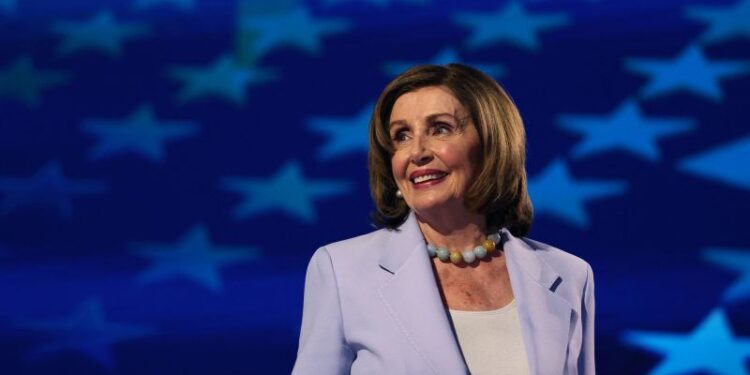Nancy Pelosi, the first and only female speaker of the US House of Representatives and one of the most powerful figures in Democratic politics for decades, has announced she will not seek reelection.
“I say to my colleagues in the House all of the time, no matter what title they had bestowed upon me – speaker, leader, whip – there has been no greater honor for me than to stand on the House floor and say, ‘I speak for the people of San Francisco.’ I have truly loved serving as your voice in Congress, and I have always honored the song of St. Francis, ‘Lord make an instrument of thy peace,’ the anthem of our city. That is why I want you, my fellow San Franciscans, to be the first to know. I will not be seeking reelection to Congress,” Pelosi, 85, said Thursday in a sweeping video that stood as a love letter to the city she has represented for nearly 40 years in Washington.
“With a grateful heart, I look forward to my final year of service as your proud representative. As we go forward, my message to the city I love is this: San Francisco, know your power. We have made history. We have made progress. We have always led the way, and now we must continue to do so by remaining full participants in our Democracy and fighting for the American ideals we hold dear.”
The announcement ends heightened speculation in recent days that the longtime Democrat would soon announce her intention to draw her congressional career to a close after 38 years. She was widely expected to leave Congress after this term, her first in decades as a rank-and-file member.
Pelosi was first elected to Congress in 1987, and made history as the House’s first-ever female speaker in 2007. She remains the only woman to have yielded the gavel, which she earned after the 2006 and 2018 elections. Even now, decades after her ascent to the top of the House Democratic caucus, she remains one of the most influential voices in the party.
The congresswoman made public her decision to retire two days after one of her biggest political victories in recent years: a resounding win for a ballot measure in California that redraws the state’s congressional map to favor Democrats ahead of the 2026 midterm elections. She personally raised tens of millions of dollars for the push, according to a person familiar with her fundraising efforts.
While Pelosi herself wasn’t on the ballot Tuesday, it was a fitting closing coda to a storied political career. The long-time Democratic leader has devoted her recent years in Congress — both as speaker and as a rank-and-file member — to fighting President Donald Trump and his remake of the Republican Party. In recent months, she worked furiously behind the scenes with her longtime friend, Gov. Gavin Newsom, to pass “Proposition 50,” which won with a whopping 63% of the vote.
Raised in Baltimore’s Little Italy neighborhood, Pelosi grew up walking the halls of the Capitol, where her father served as a US congressman from Maryland. The daughter of one former city mayor and the brother of another, her colleagues have often attributed that upbringing to her sharp negotiating tactics and fierceness in politics. She held an iron grip over Democrats in Congress — almost never losing a vote on the floor, which has been a regular occurrence under the House GOP — and used old-school tactics to keep that power, including exacting revenge on her rivals by blocking them from powerful committees. She never once faced a serious challenger in her time as speaker. (Behind the scenes, she encouraged endangered Democrats to run against her publicly if they needed to do so to win favor at home, telling them: “Just win.”)
Two years after Pelosi stepped back from House Democratic leadership under pressure to let the younger generation in the party lead, the longtime congresswoman is still widely regarded as one of the most powerful speakers in modern history. In her second term with the gavel, Pelosi presided over historic clashes with Trump, including congressional oversight battles that twice escalated to the level of a rare House impeachment against a US president. In one of her most infamous moments of Trump’s first term, Pelosi tore up a copy of the president’s State of the Union speech to Congress while sitting behind him during the nationally televised address.
The animosity between the two reached a new level after the January 6, 2021, attack on the US Capitol, during which pro-Trump rioters stormed the complex and among the widespread destruction broke into Pelosi’s leadership suite and terrorized her staff.
Her legislative legacy, however, extends far beyond Trump. As a newly elected representative from San Francisco in the late 1980s, her maiden speech focused largely on fighting the HIV/AIDS epidemic. Since then, her time in Congress has spanned seven presidents, during which she cast historic votes such on whether to authorize then-President George W. Bush’s nascent war in Iraq after the September 2001 terrorist attacks or to impeach then-President Bill Clinton. (Pelosi opposed both measures.)
After a steady climb up the leadership ladder, Pelosi first won the speaker’s gavel 18 years ago. Then, in 2019, Pelosi took the gavel again, becoming the first person to win non-consecutive terms as speaker in six decades.
“It is an historic moment for the Congress, and an historic moment for the women of this country,” Pelosi said in her first speech as speaker in 2007. “It is a moment for which we have waited over 200 years.”
Her time leading the House Democratic caucus included two separate stints during which the party held the White House and majorities in both the House and Senate. During those years of full Democratic control of Washington, Pelosi, alongside then-Senate Majority Leader Harry Reid, followed by Chuck Schumer, muscled through enormous pieces of legislation, including the landmark Affordable Care Act, of which Pelosi’s team has described her as the “chief architect.”
She had a long-time and personal relationship with the most recent Democratic president, Joe Biden, and the two passed billions of dollars in new funding to help the nation recover from the Covid pandemic and expand programs, like the enhanced ACA subsidies now at the center of the government shutdown. But Pelosi notably withheld her support for Biden in the final months of his campaign and was also one of the senior Democrats who was privately helping to encourage him to leave the presidential ticket in the summer of 2024, worried about his ability to defeat Trump. (Former first lady Jill Biden later called Pelosi’s actions in the run-up to the election “disappointing” after 50 years of friendship.)
In her nearly four decades in office, Pelosi steered Democrats as more ardent redistricting efforts peeled away moderates in the party — nearly eliminating the southern Blue Dogs who once almost tanked the Democrats’ health care law. Now, the caucus represents a far more left-leaning party, with virtually no dissent on once-divisive issues like abortion or gay marriage.
Years after drafting that health care law, Pelosi then helped Democrats win back the majority in 2018, fueled by anti-Trump wave on a health care-driven message that was a direct result of the Trump administration’s repeated attempts to repeal the law.
She oversaw a time of rapid change in the party, as increased political polarization reshaped national politics. That included a sharp rise in political violence that struck her own family in 2022, in which her husband Paul Pelosi was violently attacked with a hammer by a man who broke into their San Francisco home. Paul Pelosi, who suffered a fractured skull, required surgery and underwent a long recovery. She later told CNN that the attack complicated her decision on whether to remain in party leadership at the time.
Pelosi does not often speak of the glass ceilings for women in politics or her own role in breaking them. But she has previously opened up to CNN about playing in what was traditionally a boy’s club of politics.
“I get some names called, because if you’re effective as a woman, then they have to undermine you, because that’s a real threat,” Pelosi said in an interview in 2018.
She reflected at the time on the importance of projecting confidence.
“You know why I do it? I do it, because I want women to see that you do not get pushed around. You don’t run away from the fight,” she said.











